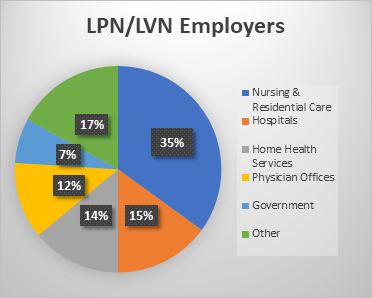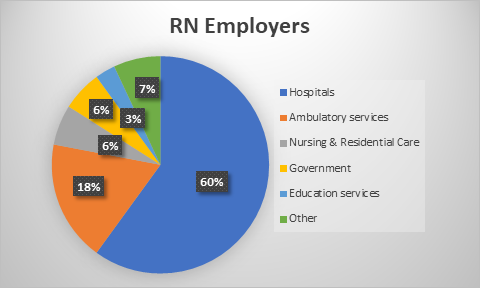RN or LPN/LVN: Which is Right for YOU?
Thinking of going to nursing school? Great! You’re choosing a satisfying career that’s expected to continue to grow for the next decade. The demand for nurses will increase as the population gets older, develops more chronic conditions, and requires a wider range of services. Nurses will also be needed for new modes of caring for clients, including telemedicine.
One of your first decisions will be to select your nursing path. Do you want to become a Licensed Practical or Vocational Nurse (LPN/LVN) or a Registered Nurse (RN)? There is no right-or-wrong answer; several factors must be considered in order to make the best choice for your circumstances.
What does an LPN/LVN do?
A Licensed Practical Nurse is a professional who plans and manages patient care according to each individual's needs under the supervision of a physician, Registered Nurse, or Nurse Practitioner. (NOTE: California and Texas use the term Licensed Vocational Nurse.)
Their duties generally include providing routine care, observing and documenting clients’ health, administering standard medications, reinforcing education, and communicating with clients and their families.
What does an RN do?
A Licensed Registered Nurse is a professional who is responsible for managing and coordinating client care. The RN can perform comprehensive assessments, administer complicated treatments and high-risk medications, and assign and oversee tasks of LPNs and unlicensed assistive personnel (UAPs).
The RN communicates with the physician or health care provider regarding client condition. RNs also provide client and family education, as well as design and implement care plans.
At-a-glance: Comparing LPN/LVN and RN
| LPN/LVN | RN | |
|---|---|---|
Number in work force 2021 | 657,200 | 3.1 million |
High School diploma or GED required | X | X |
Associate or Bachelor’s Degree required | X | |
Years of nursing school | 1 year | 2-4 years |
Passing NCLEX required | X | X |
Licensed by state | X | X |
Main source of employment | Residential care (35%) | Hospital (60%) |
Median annual salary | $48,070 | $77,600 |
LPN/LVN: A good way to jump start your nursing career
Health care certainly needs Licensed Practical/Vocational Nurses (LPN/LVN). According to the Bureau of Labor Statistics (BLS), there will be about 58,000 job openings for licensed and vocational nurses every year over the next decade.
Pros of becoming an LPN/LVN:
- Requirement for entry: High school diploma or GED. There are no course prerequisites.
- State-approved training programs are offered by technical schools and community colleges.
- Training takes only 12 months, with both classroom and clinical education. You are then eligible to take the NCLEX to become licensed.
- Average cost of an LPN/LVN school: $10,000-$15,000. Financial aid is often available.
- Experience as an LPN/LVN can be useful as a stepping-stone to becoming an RN.
Cons of becoming an LPN/LVN:
- Salary is lower than a Registered Nurse.
- Fewer job and specialization opportunities.
- Scope of practice is narrow compared to an RN’s.
- LPN/LVN diploma does not earn college credits.
- Some RN schools will not waive courses for LPN/LVN experience.
Where do most LPNs/LVNs work?

Data: U.S. Bureau of Labor Statistics, October 2022
Over one-third of LPN/LVN professionals work in gerontology settings: nursing homes, residential care, memory units, and other long-term care facilities. Here the LPN/LVN works under the supervision of a Registered Nurse who often oversees several units or is also an administrator. In turn, the LPN/LVN can assign tasks to UAPs, such as Certified Nursing Assistants.
Many hospitals no longer hire LPNs/LVNs, preferring to recruit RNs with a bachelor’s degree who are able to provide a wider scope of nursing duties. Depending on the location (rural settings are more likely to hire non-RNs) hospitals may welcome an LPN/LVN as a team member who can provide basic care and be a valuable part of the blended-care model. Common units for an LPN/LVN include OB/post-partum, surgery, and medical, where their support can lead to better outcomes and early discharges.
Home health services include working with clients in their homes when the client or their family cannot provide care. Clients may be elderly, terminally ill, recovering from surgery, or managing treatments such as peritoneal dialysis.
Physician/Medical practice jobs can be either clinical or administrative. Many LPNs/LVNs like to work in a small setting with regular hours and no weekends or holidays, in exchange for lower pay. On the downside, the scope of practice can be very limited and feel repetitive over time. Opportunities for promotion can be minimal.
Government positions can be found in Federal military or veteran programs. Nurses can also work for state or local agencies or health care organizations.
The “Other” category includes jobs such as medical call centers, insurance companies, medical transcription, customer service, sales, and private duty nursing.
Registered Nurse: The demand keeps growing
Simply put, the need for RNs never ends. The BLS estimates that at least 203,200 nurses will be needed every year for the foreseeable future. While some of the openings are from current RNs who are retiring or leaving the work force, there are more and more opportunities in specialty nursing and non-hospital settings.
Pros of becoming an RN:
- Excellent pay, even as an entry-level nurse.
- Jobs are always available everywhere, full-time or part-time.
- Specialization and certification provide more opportunities.
- Changing areas of practice allows for diverse experiences.
- Great upward mobility and career advancement.
Cons of becoming an RN:
- Cost of an associate’s degree is about $13,000 to $20,000 at a public community college. Tuition for a bachelor’s degree can cost $20,000 to $100,000, depending on the school. Financial aid is often available.
- Being an RN can be stressful because of the responsibilities and leadership demands.
- Possible exposure to contagious diseases and body fluids.
- Being an undervalued member of the health care team.
- Potential liability as a licensed professional.
Where do most RNs work?

Data: U.S. Bureau of Labor Statistics, October 2022
According to the BLS, six out of ten RNs work in a hospital or clinic. However, within these settings, jobs can vary from being a staff nurse, to an administrator, to an adjunct professional in a department such as quality assurance or risk management.
Ambulatory services include outpatient clinics, day surgeries, dialysis centers, physician and medical group offices, urgent care clinics, and schools.
In nursing and residential services, the Registered Nurse is often not the one to provide direct care. Rather, the RN will oversee a team of LPNs/LVNs who are working on the units. The RN may also serve as the administrator and/or supervisor of other services.
Government positions can be found in Federal military or veteran programs. Nurses can also work for state or local agencies or health care organizations as direct caregivers or as supervisors or administrators.
Education opportunities for RNs include nursing schools, instructors for UAPs at technical or community colleges, or in public health settings. Within a hospital or clinic, the RN may oversee orientation, ongoing training, and continuing education that meets accreditation standards.
Aside from these, there are many “Other” opportunities for Registered Nurses. Telehealth is a growing branch of medicine that will require RNs. Law offices, correctional facilities, industrial and occupational settings all hire RNs for specialized work.
Which one is best? There is no “best” answer.
Most people who decide to become a nurse start with their desire to help others. Whether you choose to begin your career as an LPN/LVN or an RN, you will certainly be able to help those in need.
Choose your education based on YOUR situation:
- How much time can you devote to getting your license?
- Are you able to take classes online?
- Can you manage the logistics of getting to clinical rotations?
- What is your financial situation?
- Do you have other family or personal commitments?
- Is getting a job quickly an important factor?
If you’re planning on working in a long-term care or residential setting, the LPN/LVN diploma is sufficient. Certifications in wound care or IV therapy can expand your expertise and boost your earnings.
For many aspiring nurses, climbing the career ladder makes the most sense. By getting an LPN/LVN license, they can earn money to continue on to an RN program. There are many LPN/LVN-to-RN Bridge programs to make an efficient transition.
Bridge programs are also available for AAS-to-BSN or MSN candidates. After gaining experience, nurses often find they are drawn to a particular specialty and return to school for an advanced degree.
One of the best things about selecting a career in nursing is the ability to move up the ladder or specialize in a new field that didn’t even exist a few years earlier. There are always new opportunities. No other profession allows for a complete switch, say from pediatrics to oncology.
Finally, as a nurse, you become a member of the “Most Trusted Profession.” Every year (except 2001, when First Responders were given the award) nurses lead the nation in ratings for honesty and ethics. In 2022, 81% of Americans thought nurses were the best—14 points ahead of physicians.
No matter which path you choose to enter your nursing career, you will have many opportunities to grow, personally and professionally. It won’t always be easy, but your contribution will always be worth the effort.
 By
By 



